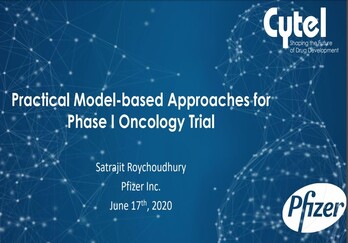Last week, Cytel conducted its third webinar in the new introductory webinar series on Complex Innovative Trial Designs. Our speaker, Dr. Satrajit Roychoudhury is a Senior Director, Statistical Research and Data Science Center at Pfizer. In this webinar, Dr. Roychoudhury gets into the basics of phase I designs in oncology trials, explains the caveats of frequently used traditional designs and provides insights on how implementing a model-based approach can enable a better statistical inference and decision-making. You can watch the replay of the webinar and access the slides by clicking on the button.

We also had the privilege to interview Dr. Satrajit Roychoudhury. Read our blog where he talks about his interest in statistics, explains the concept of Bayesian model-based approaches and their importance in oncology trials.
Dr. Satrajit Roychoudhury began the webinar with an overview of phase I designs in oncology trials. These are different compared to most of the other therapy areas as they use treatment-resistant patients instead of healthy volunteers. Doses are gradually increased with small cohort based on safety and tolerability, patient’s safety being one of the primary endpoints. There are several challenges in Phase I oncology trials such as, determination of accurate Maximum Tolerated Dose (MTD), number of patients and budget constraints, and potential high toxicity. A good design needs to cope with these challenges and use all the available relevant information.
There are different design approaches for phase I oncology trials. The traditional approaches including 3+3 design and the more sophisticated algorithmic designs, do not provide a proper statistical inference. Dr. Roychoudhury gives examples to explain how these traditional methods work and their limitations. He then helps us understand the role of Bayesian Statistics in dose escalation design. The advantage of using Bayesian is the fact that it considers prior knowledge in the form of preclinical data and clinical expertise available to us. It provides a formal framework to include all the information and allows inference of the Dose limiting toxicity (DLT) rates using tailored safety intervals. Dr. Roychoudhury introduces us to Modified Toxicity Interval (mTPI), which is a simple, Bayesian design that uses tailored safety intervals.
For this webinar, his focus is on Bayesian logistic regression model (BLRM) that uses a logistic model for dose-toxicity relationship. This model can incorporate all relevant pre-trial information into the priors and improve decision-making. Learn more about BLRM and how its techniques can improve the traditional method, by watching a replay of the webinar. Click on the button to access the recording and the slides.

About Dr. Satrajit Roychoudhury
 Dr. Satrajit Roychoudhury is a Senior Director and a member of Statistical Research and Innovation group in Pfizer Inc. Prior to joining, he was a member of Statistical Methodology and consulting group in Novartis. He started his career as a research statistician in Schering Plough Research Institute (now Merck Co.). He has 12+ years of extensive experience in working with different phases of clinical trial. His primary expertise includes implementation of innovative statistical methodology in clinical trial. He has co-authored several publications/book chapters in this area and provided statistical training in major conferences. His area of research includes survival analysis, use of model-based approaches and Bayesian methods in clinical trials. Satrajit was a recipient of a Young Statistical Scientist Award from the International Indian Statistical Association in 2019.
Dr. Satrajit Roychoudhury is a Senior Director and a member of Statistical Research and Innovation group in Pfizer Inc. Prior to joining, he was a member of Statistical Methodology and consulting group in Novartis. He started his career as a research statistician in Schering Plough Research Institute (now Merck Co.). He has 12+ years of extensive experience in working with different phases of clinical trial. His primary expertise includes implementation of innovative statistical methodology in clinical trial. He has co-authored several publications/book chapters in this area and provided statistical training in major conferences. His area of research includes survival analysis, use of model-based approaches and Bayesian methods in clinical trials. Satrajit was a recipient of a Young Statistical Scientist Award from the International Indian Statistical Association in 2019.




 Dr. Satrajit Roychoudhury is a Senior Director and a member of Statistical Research and Innovation group in Pfizer Inc. Prior to joining, he was a member of Statistical Methodology and consulting group in Novartis. He started his career as a research statistician in Schering Plough Research Institute (now Merck Co.). He has 12+ years of extensive experience in working with different phases of clinical trial. His primary expertise includes implementation of innovative statistical methodology in clinical trial. He has co-authored several publications/book chapters in this area and provided statistical training in major conferences. His area of research includes survival analysis, use of model-based approaches and Bayesian methods in clinical trials. Satrajit was a recipient of a Young Statistical Scientist Award from the International Indian Statistical Association in 2019.
Dr. Satrajit Roychoudhury is a Senior Director and a member of Statistical Research and Innovation group in Pfizer Inc. Prior to joining, he was a member of Statistical Methodology and consulting group in Novartis. He started his career as a research statistician in Schering Plough Research Institute (now Merck Co.). He has 12+ years of extensive experience in working with different phases of clinical trial. His primary expertise includes implementation of innovative statistical methodology in clinical trial. He has co-authored several publications/book chapters in this area and provided statistical training in major conferences. His area of research includes survival analysis, use of model-based approaches and Bayesian methods in clinical trials. Satrajit was a recipient of a Young Statistical Scientist Award from the International Indian Statistical Association in 2019.